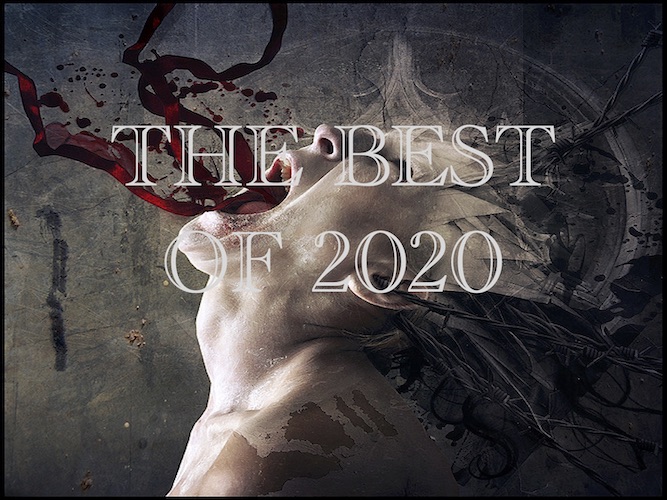
(Like the title says, we’re now at Part 2 of the countdown for DGR’s 2020 year-end list, with albums in the 40-31 positions.)
Day two is where things start to get a little more varied.
Welcome back to the patented DGR analyzes his next ten albums for interesting patterns and weird quirks section of this writeup. We’re still pretty thick in the midst of some grooving death metal here but there’s a couple of one-off appearances that I think hint at some of the grander themes that carved paths throughout the year. You’ll start seeing some really dark atmospherics take over during this phase of the list, and if some of the music here seems to be nihilistic and bleak, well congrats, that’s been the overarching theme for a lot of the year, and for me it just happened to hit a little early. Shit, I don’t think I ever got the chance to recover from last year.
There’s also a couple big with a capital ‘B’ albums here, and you’ll also likely note that I’m making no effort to break out albums and EPs from the same artist this time around. I figure if it hit in 2020, then it’s part of that artist’s grander body of work and I’m going to take in the full picture of what they manged to release. Plus, it allows me to cheap out and talk about how great some of the EPs and singles from repeat offenders were this year, and in fact were just as good as the albums that might have preceded or come after them.
2020 was pretty much anarchy, release-schedule-wise, so special times require special measures and I feel like getting as much music out in front of people as possible can only help. So, let’s continue down these treacherous pathways to numbers forty through thirty-one in these arbitrary as hell rankings and remember to play them as loud as possible.
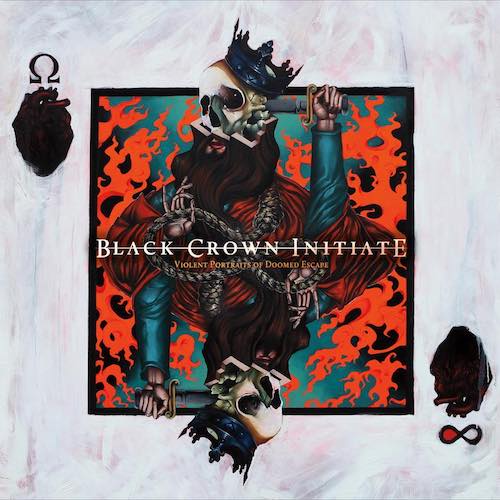
40) Black Crown Initiate – Violent Portraits Of Doomed Escape
Black Crown Initiate‘s fourth overall release is one that is fit for a lot of examination. They’re in a weird spot, because often I find myself breaking EPs and full-length releases apart from each other in terms of assessing a group’s overall career, but not with this band. EPs are often experimentations with a group’s sound and full-lengths represent more traditional efforts, yet in the case of Black Crown Initiate I feel that everything the group has released so far is important to consider when discussing their career.
The band only having four main releases makes that task a whole hell of a lot easier, but when thinking about Violent Portraits Of Doomed Escape it feels like you need to follow the group’s career trajectory from their debut EP Song Of The Crippled Bull up to the newest album in order to understand why this release may seem like one of the most natural musical conclusions for the band to come to at the moment, and why people may view it as the band’s most concerted effort to return to what they had been initially known for.
Violent Portraits Of Doomed Escape is one of the few albums I got a chance to write up this year, and while the review was not as in-depth as I would’ve liked, it still nailed a lot of the more salient points of why I’ve been enjoying it. Every aspect of it seems like it was given the fine-toothed-comb treatment, where in every moment the band were thinking ‘now how can we tie this into the others’. This is the first time in a while where the band have returned to making one solid suite of music and thematically tying it all together.
Previous discs have had repeated musical motifs and various parts popping back up, fusing certain songs together, but often they’ve felt more like musical movements with single songs in between. Selves We Cannot Forgive – as much as I enjoyed that one – sounded like a lot of ideas being brought forth and a few of them not even making it to full execution and just trailing off. Violent Portraits shows that the band have learned from that, and every song save for “Bellow” – which plays out more like an impressive vocal exercise as breather from one of the album’s more intense and highlight songs – feels complete.
In fact, one of the few reasons why Black Crown Initiate are flying in the updraft of my year-end list is that they may have been a little too successful in tying every song together, so that they kind of all wind up at near the same musical pace. It’s adventurous and the band try a ton of new stuff yet as a whole it really plays out like one humongous block of music, with “Years In Frigid Light” receiving the largest amount of body work since its single release (a whole new drum approach, lyrical changes, a lot more atmospherics) and still continuing to be something of a show-stopper.
i bookends rather neatly with the last song echoing the first one to close things out. While it didn’t quite play out as musically bombastic as the group have been before, Violent Portraits is still a disc worthy of commendation. Black Crown Initiate remain one of the more interesting acts in metal, if only just to watch how they try to work all their ambitious ideas together and still find room for a really strong power chorus or two.
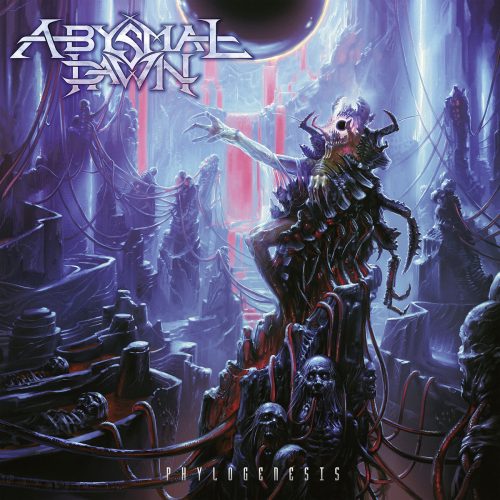
39) Abysmal Dawn – Phylogenesis
Of course, then we leap from ambition, cerebralness, and prog to Abysmal Dawn, who have long hovered over the line between tech and brutality. Phylogenesis continues the band’s current upward trajectory with some of the most vicious material they have kicked out yet.
When reviewing it I kept having to double-check album release dates because it felt crazy t0 think there was a nearly six-year gap between Phylogenesis and the album before it, Obsolescence. Obsolescence had become a constant listen and after a while had ascended to the ranks of ‘always having existed’ and so I hadn’t noticed just how much time had passed. Phylogenesis managed to get announced right around the time that the creeping sensation of ‘have Abysmal Dawn been up to much?’ only started to make itself known on my mental periphery.
Such was the strength of that previous album, and I can easily see Phylogenesis occupying a similar position, because it’s one of the more ‘if it ain’t broke, don’t fix it’ style musical discs I’ve crossed path with. I just hope this doesn’t also translate to another huge time gap before the group are able to put something else out again.
I think Abysmal Dawn are secretly gunning to be one of the ‘shuffle-friendly’ bands that I’ve often brought up as examples of what can happen when very good groups get deeper into their careers. These are bands who have found such a good foundation for their music that although they may work and change on the fringes, the core formula remains concrete. And so as you get more material from them, you can throw their music into a blender and just have a great time. Abysmal Dawn‘s five albums are starting to reach that point.
I do think that musically they’ve gotten better with each iteration and Phylogenesis is right up there as the strongest among them. I often think of the song “The Path Of The Totalitarian” as the actual opener of the disc versus “Mundane Existence”, which plays out more like a transition act from Obsolescence to the newer album. They both hit hard, but the rapid-fire vocal delivery throughout “The Path…” makes it so the song just seems to stick that much more.
Amusingly, the one song that really breaks the mold of Phylogenesis is when the band tackle Death’s “Flattening Of Emotions” as a bonus song on certain editions of the album. It requires them to really inhabit another head-space, and while they play it relatively straight, the angular approach of that song stands in decent contrast to the thick brick of death metal that Abysmal Dawn themselves dish out.
This is a disc that I personally tackled back in the middle of April upon release, if you’re seeking some truly studious and deeper dissection in near song-by-song fashion of the music, but my opinion remains largely unchanged. They managed to hone in even further on an already well-refined sound and it works out well in their favor. Phylogensis is polished, relentless, and for the most part fairly even-keeled in its brutality. Due to that, Abysmal Dawn have once again created the sort of album that just seems to ‘go’, and before long you won’t notice just how many times you’ve traversed its musical landscape. You settle in for a heaping helping of headbanging, and then continue repeating until inevitable neck ache sets in.
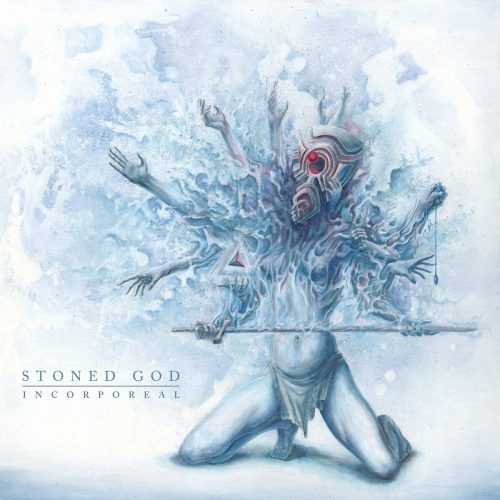
38) Stoned God – Incorporeal
Stoned God appear courtesy of the branch of my musical listenings that was invested in massive grooves this year. Though I’m typically the guy with various worlds of blast-happy death and grind on these lists, there is always going to be a part of me that can’t help but be drawn into a gigantic and lumbering rhythm section, which is how some of the more -core oriented stuff winds up here year after year.
The German group’s newest album Incorporeal landed way early on this year, and it was this very site that tipped me off to it. Because yes, even in the great waterfall of music under which we all meditate here, things still often fly by us individually, and we have to rely on our fellow writers to fish things out. Stoned God was one of those, and the release day review of the album was enough to get me invested – you can’t drop a phrase like prog-death without at least raising one of my eyebrows. Incorporeal has lofty ambitions for sure, sounding like the crossroads of a buffet of different artists, yet Stoned God blend it all together so well that each thundering step forward from the band truly feels like their own.
As was often this case with my own listening experience, this often transformed into every song hitting like a ton of bricks. Stone God are very fluent in the art of bouncing movement. You’re almost hypnotized into headbanging along with Incorporeal, even during the album’s most crushingly heavy segments, because there is always some sort of weight to each movement. You feel it as the songs shift up and down and inevitably you too become a metronome swaying back and forth.
One of the more amusing thoughts about knowing all of that is that your very first taste of the band during the song “Celestial Deicide” is actually a brief hit of clean vocals before things get really brawny. Stoned God use a lot of different weapons during Incorporeal, hence the comparisons of its different hybridizations to so many bands of the current scene. I’ve read comparisons ranging from Black Crown Initiate to Gojira to Fit For An Autopsy, and I can easily understand all of them as Stoned God chameleon their way through so many of the punchier and more rhythmic segments of the heavy metal world with ease.
When it comes to an album like Incorporeal I expect that just about everyone will find themselves with different favorite songs. The quality is so evenly spread that there’s no clear ‘one’ to really unite around. For instance, I really enjoy the run of “The Creator”, “Illusion”, and “Alive” because it is just back-to-back wall-punching music, yet the more epic ambitions of “Glowworms” at the end also makes a play for one of the real standouts here.
I can see why certain segments of the site rally around this disc because it is an impressive work from a group early in their career, one already making a play to stand amongst much bigger fish. With promise like this already in play, Stoned God are one to keep an eye on in the future.
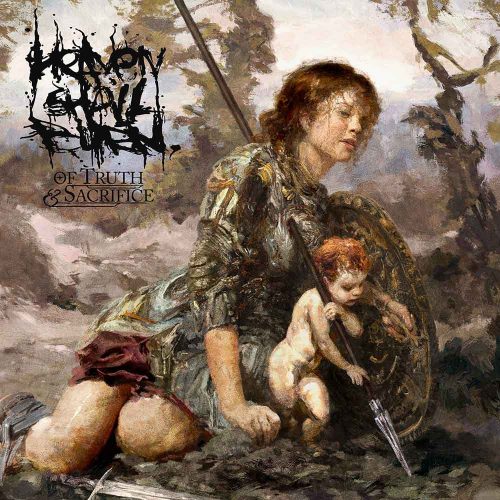
37) Heaven Shall Burn – Of Truth & Sacrifice
There are multiple takes on the phrase “this is a lot of music”. There’s the jam-packed version, which often occupies the tech-death spheres. There’s the bombastic version. There’s the crushed by the sheer weight of the material version. And then there’s the strength in numbers version. When Heaven Shall Burn decided to release a double-album in 2020, its not hard to imagine that this long-running melodeath/metalcore/righteously angry group might’ve ticked off quite a few of those boxes with Of Truth & Sacrifice.
Two discs weighing in at about fifty minutes each is a fucking lot of music. Were we still measuring quality by the dollars-to-time ratio a la the ’90s to early 2000s era of videogames when JRPGs were king because $50 got you over 100 hours of gameplay, then Of Truth & Sacrifice would be doing very well for itself. Clearly, the band had no shortage of inspiration in the four years between the release of this album and Wanderer, or so says the understatement of the century.
Double albums often have a dynamic to them – and Heaven Shall Burn play fully into this trope on Of Truth & Sacrifice – where the first disc is the one that you’ll recognize as being most ‘on brand’ for the group’s sound. It’s also the one that will usually have the most high-energy songs and the singles that are most likely to get stuck in your head over the years. It’s the double-album equivalent of front-loading an album, which makes sense given that you want to provide some sense of immediate gratification for people. That’s why the first of the two discs here seems fairly conventional by musical standards.
Bookended by two instrumentals, in between is a lot of the high-energy, power-chorus music that Heaven Shall Burn have made their bread and butter, and still worthy of all the pyro hits that the band have long since made a staple of their live shows. The second one, however, doesn’t quite feel like all of the ‘extra’ stuff that the band just didn’t want to get rid of. The second disc is an amalgamation, warts and all, of a lot of different music. There’s definitely a pacing slow-down in the cards, as Heaven Shall Burn re-imagine themselves as the providers of a few big soaring ballads, but then they also jam a few more that I think would’ve been worthy of making the first disc just so it would be a wall-to-wall assault with no bookending at all.
I have, however, gained an appreciation for the somewhat out-of-left-field stuff that makes an appearance here. It’s why I appreciate the cyber-goth rave set to a metalcore track of “La Resistance” as much as I do, I love the fact that it shows up after a fairly heart-felt mid-tempo heavy hitter on the second record, and I love the fact that it kind of just barges its way into the room, drunkenly yelling “Hey motherfuckers! Here’s a battle anthem with a shitload of synths!”. Its not even that the synth work is out of the ballpark for Heaven Shall Burn, “Combat” from Invictus has a pretty blatant synth-line break in it. I just really enjoy seeing that influence amplified.
I also found myself enjoying the new tradition of sneaking a thrash cover into the mix. Wanderer had the band’s take on Sodom’s “Agent Orange”, and now Of Truth & Sacrifice has the band tackling Nuclear Assault‘s “Critical Mass”. You really do see the shared DNA between thrash and Heaven Shall Burn‘s sound when they do this because they really don’t seem that far off from what the band are doing already, it’s just that the circle-pit aspect gets cranked up ten-fold.
Of Truth & Sacrifice is a weighty release and Heaven Shall Burn‘s method of just jamming every idea they had to hit that double-fifty-minute mark means that the second album definitely rolls around like a car with square wheels at times. Yet just having this much music from Heaven Shall Burn meant that there was no shortage of fuel for the righteous anger days, and having it for a good chunk of the year really helped to power me through.
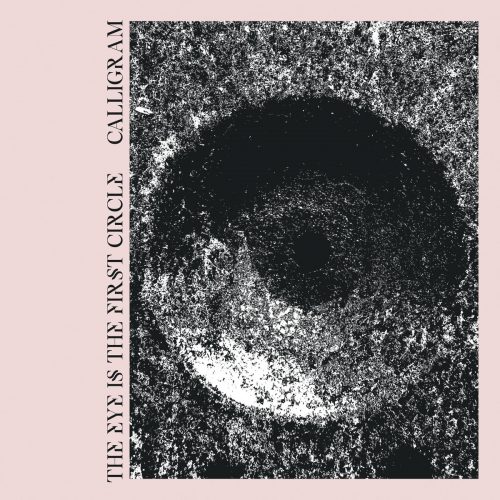
36) Calligram – The Eye Is The First Circle
We now land on one of the other narrative arcs that I referenced many moons ago (yesterday) during my opening segment, which is the groups who made this list because musically they are almost pure catharsis. These albums are the scorchers of my year-end archive, the discs that refused to stick to one particular genre and instead recognized metal, hardcore, industrial, black metal’s shrieking melodrama (in Calligram’s case, especially this one), and at least three or four more that the most studious among us may recognize for the array of sonic-weaponry that they are, and then spent – usually – a half hour or more just immolating everything around them.
Calligram’s The Eye Is The First Circle – which landed in early April via Prosthetic Records – is one such release. Alongside a fairly strong collection of compatriots that will appear throughout this much wider listing, it does an excellent job capturing the existential despair and need for release that dragging oneself throughout this year has been for a lot of people.
From moment one of this album, The Eye Is The First Circle shows itself to be a hostile beast, introducing things with a near feral series of opening vocal volleys during “Carne”. The slow build of the song is basically luring you in before it goes scorched earth and vocalist Matteo Rizzardo unleashes some throat-tearing screams upon you. Things really start to gel after the opening hammering of “Carne”, when the band launch into full circle pit and blastbeat riffing during “Serpe”. “Serpe” is one of the early album spotlights just because the drum attack is almost undeniable; once it starts shifting around for its first few blast-heavy segments you”ll be in full ‘compelled to move or else’ status.
The way The Eye Is The First Circle is written, to bulldoze its listeners, is a large reason why I couldn’t help but have it sit here for the year-ender. When you have thirty-five minutes of music across eight songs, and really the only moments of peace lying in the quieter segment of “Anedonia” and the minute and a half of “Pensiero Debole”, then you’ve got a disc that is more weapon and mood than song collection.
You can probably understand now why music like The Eye Is The First Circle might hold extra appeal for a year like 2020. Any other year and this group’s first full length would’ve made it far anyway, but the multinational act here seems to have specialized in this specific branch of hybridizing ugly as hell music at just the right time. Calligram have locked on with a lot of the sort of dark and nihilistic streak already working its way into the underground, and like much of their music have weaponized it into an monstrous beast of an album – camoflaged only by the black-and-white artwork that dominates the disc’s cover.
One of many discs that hit during April, back when it seemed like we might have some idea what we were doing, there was never any question that Calligram would fight tooth and claw into the regular listening rotation. The constant pulling from so many different extreme styles into one amorphous and violent bear of an album made it so that it was almost the fascination alone that was a constant draw, if it didn’t leave me a pile of ash by the time it was done.
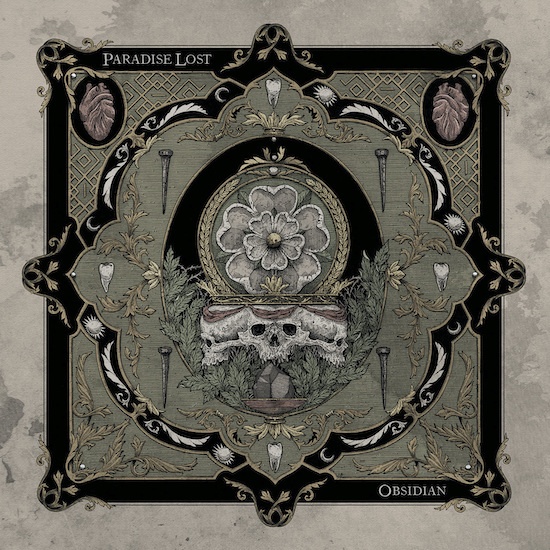
35) Paradise Lost – Obsidian
Obsidian is an odd duck of an album that arrives as the latest act in the new rennaisance of Paradise Lost. The band re-incorporated the death and doom heaviness part of their sound on 2015’s The Plague Within, bringing back some gnarly growls to go alongside the group’s penchant for powerful hooks in their riffs and strong chorus work. They have ratcheted up in intensity since their gradual genre change away from the depressive rock that had colored their early-aughts, moving back to the doom-heavy side of metal, which resulted in songs like “Beneath Broken Earth” on The Plague Within.
I bring that up in part because their following disc, Medusa, seemed to iterate upon that one specific moment, settling for eight long and heavy tracks, but once you’ve iterated once – and in Paradise Lost‘s case, almost completely refining it – where do you go from there? 2020’s Obsidian shows that Paradise Lost aren’t quite looking for an answer to that question, but instead have elected to pull a variety of different genre styles into their mix, so long as it fits their overall miserable atmosphere. They chose to go with a collection of singles and take people on a tour through the expanded universe of Paradise Lost as a whole.
Anyone who has followed this site for a while and has inevitably crossed paths with my year-end frenzy will know full well that I will always bang the drum for Team Sad-Sack, so Paradise Lost inevitably wind up worming thei way into my listening habits. Obsidian took a bit to get there since its May release via Nuclear Blast, yet it did. One of my first thoughts was not so much about the music at hand but whether or not there was some sort of wider band meeting where someone expressed the thought, “Have we seriously never named a song Darker Thoughts before this?”.
Honestly, if you were seeking for the career path of a band in one song, then Obsidian’s opener might actually be good enough for that. It really does meld together the many styles of Paradise Lost throughout the group’s lengthy career and does so in a little under six minutes while making the passage of time feel closer to a standard four-minute jam.
Of course there are gems scattered throughout Obsidian, so I found myself drawn to a generous handful of songs instead of getting excited for one specific grouping or another. Paradise Lost when they feel like they need to just try everything is a fun event. While not every song on Obsidian is perfect, there’s never any moment where the need to stop listening rears its ugly head.
It’s odd too, because it was never like there was any discernible pattern to which tracks would really perk my attention – something that’ll drive a numbers nerd like me nuts – but it seemed like there would be groups, rather than an every other for a bit kind of thing. That meant the aforementioned “Darker Thoughts” actually stuck with me for a while, but then later I found that the next recommendation would be “The Devil Embraced”, if only for the sing-song nature of its chorus. Then the run from “Serenity” to “Hope Dies Young” latched its claws into my skull for a bit — and you can see how an album like this tends to make someone look like a crazy person, just because their favorites might seem so scattershot compared to everyone else’s. Yet, Obsidian is that sort of album.
I like it because I’m a sucker for Paradise Lost, and my favorites may not be close to yours, especially if you’re a bigger fan of their doom side, but I’d still argue for it anyway just based on the nature of it being all over the map. It isn’t as consistent to one style as The Plague Within or Medusa, but Obsidian still showed itself to be a listening journey worth taking this year.
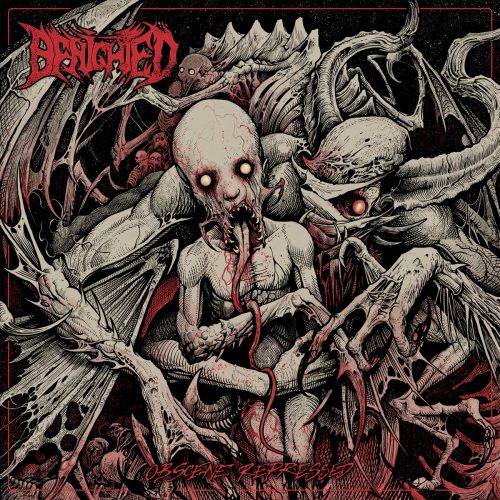
34) Benighted – Obscene Repressed/Stab The Weakest/Serve To Deserve
I am somewhat proud of the fact that this grouping of three or four albums in the center of this writeup may be some of the harder swings moodwise that I could cobble together. Moving from the scorched-earth approach of Calligram to the pensive and moody Paradise Lost to this particular crusher, and on to the album that is just ahead of this one in my arbitrary rankings, has to be the music writer’s version of going down a child’s slide at a park while you’re in your thirties, drunk, and yelling ‘wheeee!’ the whole way. Although given Julien Truchan‘s patented ‘breeeeeeee’ lyrical stylings, perhaps something a little lower during the half-a-second infernal descent into whatever they’re using so kids don’t hurt themselves these days. But I digress.
What we’re looking at here is France’s Benighted and their grander body of work, which is the deathgrind concept album funfest that is Obscene Repressed and then their celebratory holiday single “Stab The Weakest” — and whoof, what a heck of a year this band had musically.
Benighted’s manic stylings have held appeal for me for an increasingly long time. Even though I’ve generally tried to avoid being on a particular artist beat so that people don’t go ‘well of course he’s covering that one’, I’ve been comfortably covering Benighted’s clockwork descents into madness every few years. Obscene Repressed is only the latest in a long-running exploration of the French group’s musical devastation. It also marks the second appearance on my year-end list for Cytotoxin vocalist Grimo so far, thanks to how tightly that band has bonded itself to this particular scene.
Often, artists will move in particular ways when it comes to albums when the two prior feel like two very distinct beings from each other. Obscene Repressed follows this path, mixing together the sort of ‘in the midst of complete overstimulation’ of Carnivore Sublime and the focus on metric brutality that is Necrobreed. Obscene Repressed tip-toes the line between the two, sometimes whipping out songs in brutal-death stylings similar to Necrobreed but more often going for the overwhelming deathgrind approach of Carnivore Sublime, which is very welcome on this end of the internet.
I know that for a lot of people the focus of a year-end list should be on discrete albums, but I think this year in particular – and this is the second time now I’ve gone with an artist’s grander body of work for the year – it can’t be helped that you view a whole collection of work as part of the overall 2020 experience. So it isn’t so much that Obscene Repressed would not have wound up here on its own, but Benighted also giving us the benefit single of “Serve To Deserve” and the blatant Halloween celebration of “Stab The Weakest” kind of cements it here.
Both singles are about as Benighted as Benighted could get, though “Stab The Weakest” has a lot of fun with its main melody, but combining it with the relentless assault of the full album that the band put out in April just fits. It results in a ton of music, and a huge chunk of it – save for “Implore The Negative” with its slower grooves and hXc shouting – is served at a constant rapid clip. Its an aural mowing over, but it’s what I’ve come to expect from and specifically come to a group like Benighted for.

33) Wolfheart – Wolves Of Karelia
Much like Heaven Shall Burn‘s Of Truth & Sacrifice a little bit further up in this 2020 round-up, Wolfheart make music that is big, brash, epic, and perfect for pyro hits. It almost feels unreaslistic if at some point during a Wolfheart listening session you haven’t imagined them surrounded by jets of flame. It’s been a theme since the group’s second album Shadow World and it has continued until their latest, Wolves Of Karelia.
Truly, if you’re a pyro-loving Wolfheart fan then you’ve been living in a golden age since the album’s April 10th release via Napalm (there seems to be a theme here…) Records because you have not one, but two, songs with fire in the title and one more in the closer representing the result thereof – in case you didn’t like this joke when I reviewed the album during my first round with it.
While it is wild to see that Tuomas Saukkonen has stuck pretty close to his word in keeping Wolfheart his main project after having spread himself across a smorgasbord of acts, its also worth noting that Wolfheart are now deep enough into their discography that they have established a pretty fucking solid foundation and pattern. I go into depth on this more in my review, while also really enjoying that they’ve recruited Vagelis Karzis – who had previously been a long-running live member of Rotting Christ – into the band’s lineup. But suffice it to say the tl;dr version is that while Wolves Of Karelia hews pretty close to the patented Wolfheart formula, it’s still really fucking good.
While a good chunk of the album is Wolfheart doing their best Wolfheart job, the time in between discs did allow them to stretch a bit. It allows for some interesting takes on their overall formula. “Hail Of Steel” and “Horizon On Fire” are fun ‘welcome back to the party’ style songs for longtime listeners but it’s tracks like “Reaper”, “The Hammer”, and yes, “Born From Fire”, that really make Wolves Of Karelia worth the listen. They’re interesting spins on a formula that is so firmly set in stone that it will likely be used to translate languages in the future when humanity destroys itself. The string hits spinkled throughout “Reaper” during the blasting-shit-to-bits segment leading up to its chorus make that song come across much larger than expected from an already big-sounding group.
Wolfheart are the sort of band where any disc could serve as an excellent starting point, so Wolves Of Karelia is just as easy a recommendation as one could come across. Five albums deep, and they’ve amassed an impressively solid slate of material, all of which are around eight songs and forty minutes long.
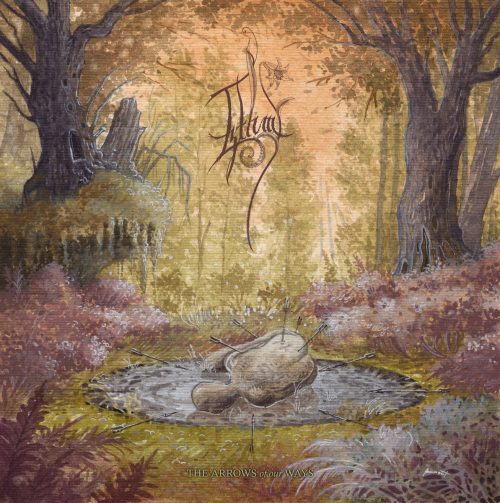
32) Izthmi – The Arrows Of Our Ways
Izthmi are one of the beneficiaries of a tendency to glance at least once at everything that arrives in our promo box, although I had spotted them previously in a 2019 Shades of Black so there was some familiarity there, because I am not a tremendous fan of forest black metal. Actually, my wider view of the genre as a whole generally places me in a sort of jokingly antagonistic stance to begin with, but the wispy fog, moss-filled forests, and long-form songwriting styles of that particular branch (heeeyyoooo) of that particular subgenre has never held wild appeal to me, even though it’s become one of the more popular styles out there right now amongst the metal commentariat.
This of course is one of those times where I get to proudly state that I can completely understand the value, it just never quite sticks with me as much as I want it to. That said, there are a few that manage to get through every year and often those are the ones that I’ll then hammer my fellow writers about it because I figure if they can slip past someone who is as much of a dense idiot as I am, then clearly they can hold much greater appeal for those who eat this up like someone with $20 to spare and a hankering for dollar menu items.
Which brings us to The Arrows Of Our Ways. This Seattle group is early in their career with just a demo and now a full-length to their name, but it says a lot that The Arrows of Our Ways was one of the earlier volleys of music – released in mid-February – that has still managed to hang on with every ounce of its strength until the end of the year. At eight songs and a little over forty-five minutes worth of music, it is both an immensely ambitious album for a young group and also one that follows its genre-blueprint about as closely as they could. Between the ghostly stringwork, various multi-media samples, and the quite ambience that permeates the disc, you have the bulk of Izthmi’s music. Like may of its forebears, it often comes across as pure catharsis, especially as both the song lengths and song titles seem to get longer as you work your way to the back half of The Arrows Of Our Ways and its title track.
The album is one of those releases I actually thought I’d have a lot of difficulty talking about, and in some ways that’s true, because this is one of the few releases out there that I think is better served by not breaking it out into specific songs. I think the band have a mood-piece here, an album where you have to wait for some overcast skies and rainy weather (as has happened in my neck of the woods a few times during this writing) and set forty-five minutes aside, as if you must match the sort of atmospheres the band are painting with in the real world.
The Arrows Of Our Ways moves in two-song blocks, bookended by instrumentals and atmosphere-work each time. The spoken samples are a little loud in the mix, but otherwise each of the sort of movements within The Arrows Of Our Ways works out pretty well. While I can’t pretend to be an expert on the subject like I can with many of the other releases on this list, I can recommend it for those (like myself) who may not dip their toes into these specific waters all that often. The Arrows Of Our Ways is well worth checking out.
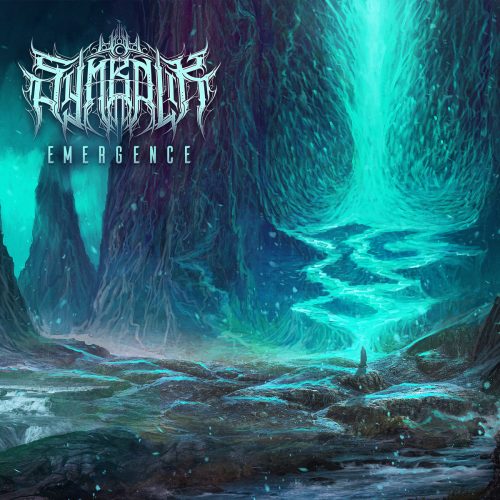
31) Symbolik – Emergence
Now back to the shiny, blasty stuff.
As I stated in my review at the time, Symbolik’s 2020 release Emergence was a long time coming. Nearly nine years after the release of their EP Pathogenesis and five years after a single, Symbolik were finally able to release their first full-length this year. Whether it was worth the wait is a debatable question because, surprisingly enough, the lineup hasn’t shifted all that much from when I saw them live in support of that promising first EP, and Emergence still feels like a soft-relaunch of the band.
The Stockton, California based crew still maintain a heavy focus on a wall of shredding guitars – perfect for the album’s current Artisen Era home – reinforced by Chris Blackburn‘s intense and high vocal delivery. Yet for Emergence the band added a whole lot of synth and orchestra work to the band’s already jam-packed formula. Emergence also turning out to be a crafted story means that despite this album effectively being a lot of people’s first exposure to them thanks to the passage of time, the grand ambitions that had long been a throughline for the band still remain firmly in place.
Although forty minutes and ten songs may seem pretty standard on first impression, based on the evidence of a lot of metal’s grander acts, you have to keep in mind that Symbolik are part of the current wave of light-speed tech-death artists who will fire every single weapon in their arsenal on every song, with anything resembling subtlety being tossed out the window like an Olympic javelin throw. Seriously, once “Augury Of Ancients” hits its full accelerated tipping point it is time to settle in, because Emergence was written to be a whole lot of that specific theme, and more of it, and differing variations on it, so that by the time it’s done your total guitar-riff and lead count is being calculated in powers of ten vs straightforward digits.
Throughout Emergence, Symbolik make it clear that they’re fully aware of just how much they’re throwing at you, and while they don’t particularly care, they spice up affairs by placing all sorts of angular and at times neo-classical guitar work, just so that while the music may still be tearing out of your speakers at lightspeed, there’s a ton of interesting little twists and turns on the way. Emergence builds up to its closing song, “When Eternity Collapsed”, which bookends the traditional part of its musical heft with the sort of bombast that the group had been using to add melodic lines throughout the rest of the disc.
In any other year I can imagine Symbolik doing rather well on the music-nerd front because they’ve accomplished what a lot of their ilk do, which is to make an album so overwhelmingly full of twists and turns, differing melodies and musical motifs, and a ton of solos, that it all gives the album a severe edge in the battle for supremacy in the war of the wall of notes. As it stands, attempting to keep themselves locked inside their house as much as possible may have also worked in heir favor because this is a disc that I finally feel like I’ve had the time to fully digest.
While I have often – and likely still will – warned people when it comes to releases like Emergence that you have to ‘prep’ yourself beforehand lest you get lost, I still found myself having a blast as Symbolik just musically dove in like a raptor getting the drop on its prey and then just as quickly rocketing themselves out. If you’re looking for forty minutes of packed-to-the-gills music delivered at lightspeed, Emergence is one of 2020’s finer offerings.
